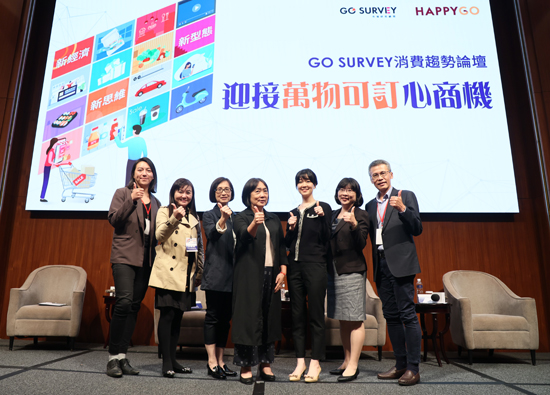02.2023 Office Talk
Embrace changes and innovate retail soft power
Group comprehensive efficiency and retail planning headquarters / provision


 The epidemic has spread all over the world, and the new normal economy has been born. "Transformation" has become a subject that all enterprises must face. The R&D Center of Science and Technology Management of Tsinghua University held a series of speeches to invite various industries to discuss the development trend of innovation after the epidemic. Li Jingfang, CEO of the Group's Integrated Efficiency and Retail Planning Headquarters, was invited to share the retail trends and breakout strategies under the post-epidemic situation with the theme of "service innovation with temperature stores", with a view to jointly creating the new normal value of business through industry-university exchanges and sharing.
The epidemic has spread all over the world, and the new normal economy has been born. "Transformation" has become a subject that all enterprises must face. The R&D Center of Science and Technology Management of Tsinghua University held a series of speeches to invite various industries to discuss the development trend of innovation after the epidemic. Li Jingfang, CEO of the Group's Integrated Efficiency and Retail Planning Headquarters, was invited to share the retail trends and breakout strategies under the post-epidemic situation with the theme of "service innovation with temperature stores", with a view to jointly creating the new normal value of business through industry-university exchanges and sharing.Outbreak of the epidemic impact on retail virtual and real integration
In 2020, the COVID-19 began to hit all major industries, especially the retail industry in the 1.5 row of the tsunami, which suffered a great deal. The repeated epidemic in the past three years made the general merchandise, entertainment, and cash flow face recession. In 2022, with the gradual slowdown of the global epidemic, and the opening of markets in various countries, retail also gradually showed signs of recovery. In the first three quarters of this year, the annual growth of Taiwan's physical retail industry reached 8.68%, higher than the 7.54% growth of e-commerce industry in the same period. However, the outlook for the global economy is not optimistic. Political conflicts, high inflation and sharp interest rate hikes have clouded economic growth and made people's consumption tend to be conservative. The outlook for the retail industry is still quite variable.
Li Jingfang, Executive Director of the Group's Comprehensive Efficiency and Retail Planning Headquarters, analyzed that during the two waves of epidemic warming in Taiwan in 2020 and 2021, the physical industry declined significantly, while e-commerce grew by leaps and bounds. In June 2021, when the epidemic was severe, YoY in the e-shopping and mail order industry was 33.7%, with the growth rate reaching a record high; And since the epidemic began in 2020, Taiwan's e-commerce has maintained a positive growth trend. The long epidemic has also changed consumer behavior, reducing the time spent in shopping malls, and developing living habits such as delivery online shopping. The epidemic has accelerated the pace of retail transformation. Although the virtual and real integration of the whole channel is a repeat of the old one, it has changed from one-way O2O (Online to Offline/Offline to Online) to two-way OMO (Online Merge Offline). With the help of the epidemic, the physical channel needs to make more efforts to experience online and offline.
Grasp trends and create temperature differences
Li Jingfang, CEO, pointed out that the COVID-19 has changed consumers' values. Consumers believe that their future life is still full of uncertainty, which affects their consumption value. Ernst&Young pointed out in the "Future Consumer Index" that the five major consumer groups in the post-epidemic era include: 1. price priority (30%), living within one's means and paying attention to the CP value to avoid unnecessary shopping behavior; 2. Health priority (26%), care about health and avoid risks; 3. Give priority to the environment (17%), pay attention to environmental protection and purchase sustainable products; 4. Give priority to society (16%), pay attention to social issues, and tend to communicate with local honest brands; 5. Give priority to customer experience (11%), live in the present, be brave to try new things and experience. It is obvious that economic capacity and health issues have become the most important consumption considerations for consumers today. At the same time, the epidemic has also made consumers start to reflect on the impact of consumption behavior on the environment and society.
Doug Stephen, an international futurist, put forward in his book "Post-epidemic retail trends" that retail brands should consider the positioning and value of products, culture, entertainment experience and professionalism in the context of large-scale platforms. Li Jingfang, Executive Director, pointed out that after the epidemic, the sales channels are more diversified, and physical retail should reposition its own value, not only through the channel of selling goods, but also to create more fields of interaction, experience and memory. The key factor is whether it can provide the difference experience with temperature. By emphasizing the texture experience, increasing the temperature connection, communicating style and attitude, it should be used as a niche for communicating with customers, brand positioning The unique and unique best contact point field can reshape the value of the field and attract people back to the store.
Executive Director Li Jingfang also reminded that in addition to the service and emotional exchange in the store, the value of the store should also be considered from the perspective of social corporate responsibility, including the three levels of customers, employees and brand suppliers, and the spirit of mutual assistance and altruism should be practiced from the heart to create a warm store and show the warm strength of the enterprise. Every person and every enterprise is a point. With this as the center, the positive energy of love and care can be extended from the store to every corner of the community and the city, giving full play to the positive social influence.
Data-driven customized experience
The epidemic has accelerated the pace of digital transformation of enterprises. IDC, a research and research institution, said that this trend has brought a "digital first" world to the global industry. In order to achieve the ultimate retail future of customer experience, CEO Li Jingfang said bluntly: "It needs to be driven by data to build a temperature difference." Through the analysis of data representation, the intangible customer appearance and exploration needs can be pieced together to create differences, understand customers, create customized experience, and refine data into more valuable realization methods. The reversal of this new retail experience will take scientific and technological data as the bearing and customers as the core, and then promote the differentiated retail experience rich in temperature through the hands of the executive.
Embrace change and embrace the new normal
VISA International Card Issuance issued the 2030 Future Business Report. The key trends include: data is the catalyst for growth, virtual monetization, highly personalized consumption, omnipresent marketing, perpetual priority purchase journey, redefining the value of money, and business without borders. The consumer market in the future still presents treacherous uncertainties, but it may also be the best starting point for creating a new future. CEO Li Jingfang reminded that the more complex and unpredictable the "VUCA" (Volatility. Uncertaintiy. Complexity. Ambiguity.) is, the more we should review our strengths and weaknesses, the more we understand ourselves, and the faster we can adapt to the increasingly unpredictable changes in the world.
The redefinition of physical retail, whole-channel thinking, and strategic alliance to form an ecosystem will be the new normal that the retail industry must face. The technological evolution and the market are changing rapidly. In the post-epidemic era, the integration of online and offline channels has become an inevitable trend. With the prevalence of the virtual world of the universe, breaking the virtual boundary and creating new life and shopping experience will be the foreseeable future. "One person goes fast, a group of people go far". In the future, the speed of cross-border ecosystem integration will be accelerated, the uncertainty and complexity of the market will continue to increase, and the retail industry is still in a state of crossing the river. In the face of the unpredictable market, we should be more alert, flexible and react quickly, so as to get out of the shell and change in the face of adversity.
#


















